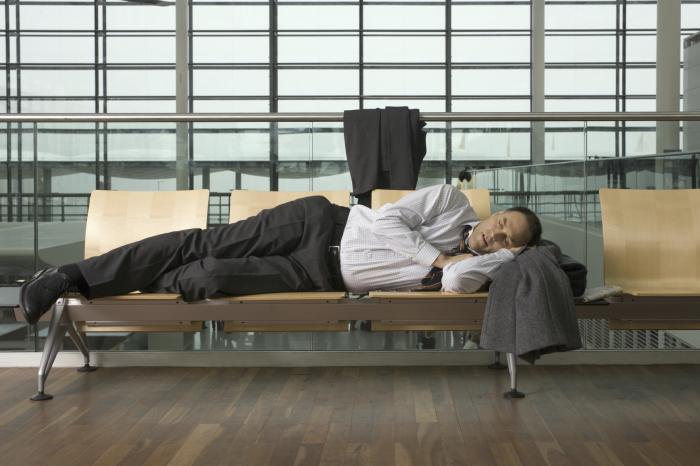
Jet lag is a temporary condition when a person’s internal clock is lobbed off by traveling quickly across multiple time zones. It can cause many symptoms, such as tiredness, trouble sleeping at night, headaches, stomach problems, and anger. How bad jet lag is can depend on things like how many time zones were crossed, the direction of travel, and the person’s age and health in general.
Table of Contents
Why jet lag happens
When a person quickly travels across multiple time zones, their body clock, or circadian rhythm, is thrown off. This is called jet lag. The circadian rhythm is a 24-hour cycle that controls the body’s internal clock. It controls sleep-wake cycles, hormone production, and other bodily functions.
This natural cycle can be thrown off by traveling quickly across time zones, leading to confusion between the internal clock and the outside world.
This can lead to tiredness, trouble sleeping at night, headaches, digestive problems, and irritability, among other things. How bad jet lag is can depend on how many time zones were crossed, the direction of travel, and the person’s age and health in general.
What causes jet lag
Changes in time zones and circadian rhythms
When you travel quickly across multiple time zones, your body’s internal clock can get out of sync with the outside world. This can cause symptoms of jet lag.
Sleep deprivation and messed up sleep cycles
Long flights can mess up normal sleep cycles, which can make you tired and sleepy during the day.
Lack of oxygen and dehydration on long flights
Airplane cabins’ low humidity and oxygen levels can cause dehydration and tiredness, worsening jet lag symptoms.
Cabin pressure and air quality
To keep a safe environment at high altitudes, airplane cabins are pressurized and sealed. This can cause headaches, dizziness, and nausea.

It is also supported that travelers from west to east are more prone to jetlag than travelers in the opposite direction. People’s bodies are better equipped to deal with longer days than shorter ones. When you travel from west to east, you force your body to sleep when it wakes up.
Jet lag symptoms
The symptoms of jet lag can vary from person to person and depend on the severity of the disruption to the body’s internal clock.
Fatigue and daytime sleepiness
Jet lag can cause tiredness and drowsiness during the day, making it challenging to stay alert and focused.
Difficulty sleeping at night
Jet lag can disrupt normal sleep patterns, causing difficulty falling or staying asleep at night.
Headaches and dizziness
Changes in air pressure and dehydration during long flights can cause headaches and dizziness.
Nausea and digestive issues
Jet lag can disrupt the body’s normal digestion and bowel movements, leading to stomach upset and nausea.
Mood swings and irritability
Jet lag can cause changes in mood and behavior, leading to irritability, anxiety, and depression.

Here is some advice on how to deal with the bane of time zone crossers, jet setters, and frequent flyers.
The day before your flight
- Get a good night’s sleep. As excited as you may be, you’ll regret staying up when jetlag ruins your trip adventure.
- If you can, get a flight that arrives in daylight. Your body will adjust to staying awake and fitting in with the new schedule. Or you can opt to fly to places on the Greenwich meridian.
- Try to change your schedule to match the times of your destination. People with rigid schedules for eating and sleeping might find some difficulty adjusting to Eastern Time and should do this ahead of time.
- Build a stopover to get your body to rest and have more time to adjust to new routines.
During the flight
- Don’t drink alcohol. Alcohol at high altitudes can increase tiredness and dehydration, adding to our jetlag feeling. Opt for water instead.
- If you can’t avoid landing at night, avoid caffeinated beverages, sodas, and energy drinks. Drinks like this will distort your sleep patterns more, which adds to tiredness.
- Don’t take sleeping pills or medications to help you sleep, as they will leave you fuzzy feeling. However, if you have long flights, you should try sleeping, try drinking a cup of warm tea or milk.
- Set your time to the time of your destination as soon as you get on the plane. This will help your brain orient itself psychologically.
- Exercise and keep your blood pumping. Healthy blood circulation will help you feel better.
When you arrive at your destination
- Start following the time schedules of the place as soon as you arrive. Eat when locals eat and sleep when they sleep.
- Get some sun, if there’s any, by the time you land. The sun boosts energy levels and makes you feel better.
- Stretch and do some exercise to get your blood pumping and systems running.
- Try to get sleep, as much as you normally would within a day.
Jet lag treatment
Over-the-counter medications for sleep and jet lag
Sleep aids like melatonin or antihistamines can help regulate sleep patterns and reduce jet lag symptoms.
Melatonin supplements and light therapy
Exposure to light, especially sunlight or light therapy devices, can help reset the body’s internal clock and relieve jet lag symptoms. Melatonin supplements can also help control how you sleep.
Relaxation techniques and meditation
Deep breathing, meditation, and yoga are all relaxation techniques that can help reduce stress and anxiety, which can make jet lag worse.
Getting used to new time zones slowly
Changing sleep and meal times slowly to fit the new time zone can help the body get used to the new environment more easily.
Staying hydrated and eating healthy foods
If you drink a lot of water and stay away from alcohol and caffeine, you can avoid becoming dehydrated and tired, which can make jet lag worse. Eating healthy foods can also help give you more energy and improve your health as a whole.
Summary
To summarise, jet lag can be a struggle for travellers, but it can be treated in various ways. Travelers can lessen jet lag symptoms and enjoy their trip more fully by modifying sleep schedules, staying hydrated, and exposing themselves to natural light.
Consultation with a healthcare provider and precautions such as avoiding alcohol and caffeine can also help manage jet lag. Travelers may overcome jet lag and make the most of their vacation experiences with proper preparation and treatment.








